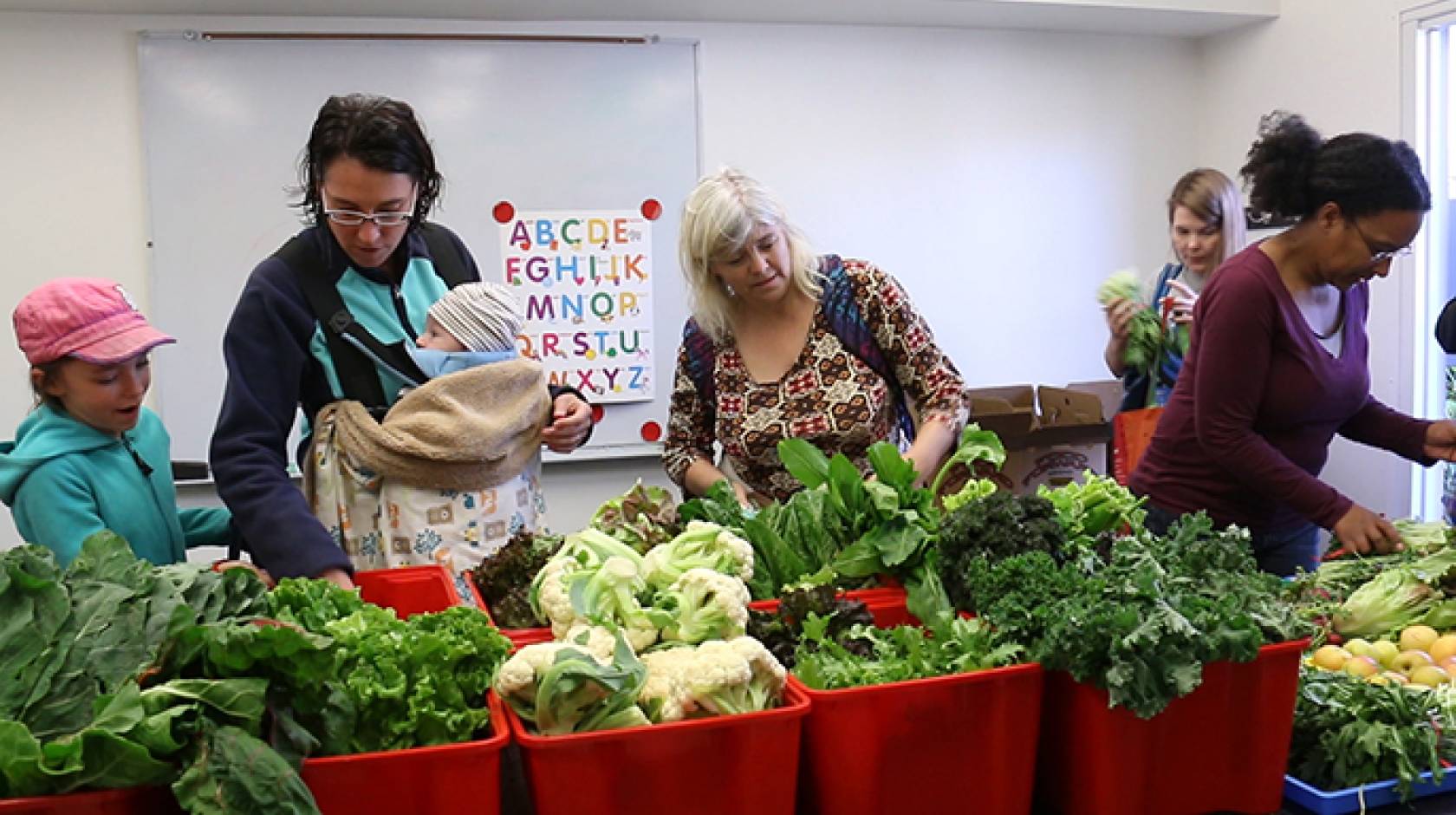Alec Rosenberg, UC Newsroom

If you piled up all the perfectly edible food that Americans throw away each day, it would fill the Rose Bowl, twice. Put another way, about 40 percent of food in the United States goes uneaten – Americans toss out $165 billion worth of food each year.
“It’s a really huge number,” said UC Berkeley graduate student Becky Mackelprang. “Reducing that number could make a very big impact on society.”
At college campuses around the country, students like Mackelprang are at the forefront of the fight against food waste.
Among the creative solutions being tested: Students have launched meal sharing plans, are working with faculty and staff to cut waste in dining halls, and are helping connect businesses with surplus food to communities in need.
On University of California campuses, the Global Food Initiative has spurred collaborations that are uniting students across the entire system.
Mackelprang, for example, is active in the GFI-sponsored CLEAR (Communication, Literacy and Education for Agricultural Research) group. Together with CLEAR students from UC Davis and UC San Diego, she works to illuminate food and agriculture issues to journalists, policymakers and the public, sharing best communication practices with other members of the group.
Food waste is at the top of their agenda for issues where they can have immediate and meaningful impact.
“The collaboration has been great,” said UC San Diego graduate student Kara Wentworth. “We’re able to learn from each other. It has been really interesting to work with people from other campuses. Waste is a place where we need new technologies and new models. This is something that we can deal with now.”
Turning food waste into clean energy

Credit: UC Davis
One new technology that shows big promise for turning food waste into clean energy is an anaerobic digester being piloted at UC Davis. Invented by UC Davis biological and agricultural engineering professor Ruihong Zhang, it is converting up to 50 tons of organic waste – including from UC Davis dining halls, animal facilities and grounds – to 16,000 kWh of renewable electricity each day, diverting about 20,000 tons of waste from local landfills each year.
The UC Davis facility is the third commercial biodigester that technology partner CleanWorld has opened using Zhang’s technology, as the company looks to expand its efforts. It hopes to get a boost from a new law, AB 1826, which requires businesses that generate a certain amount of organic waste to recycle it, rather than send it to a landfill.
“We’re just starting,” Zhang said. “We need more risk-takers to create new business models to solve this food waste problem.”
Students step up
GFI fellow Ryan Dowdy, a UC Davis graduate student who has taken a class with Zhang, is working to reduce food processing waste by converting such waste as grape pomace and tomato pomace into bioenergy and soil amendments.
Several other GFI student fellows also have projects to reduce food waste.
Sally Geislar, a 2015 GFI fellow from UC Irvine, helped the Costa Mesa Sanitary District assess the impact and potential of its municipal organics recycling program. The program, the first of its kind in Southern California, enables residents to separate food scraps from the rest of their garbage; those scraps are then turned into fertilizer as well as renewable natural gas that fuels the trucks used by the district to pick up waste. Geislar’s research showed that since the program started, two-thirds of the city’s single-family households began separating their food scraps from the rest of their trash – information that will help the district communicate about the program and potentially increase participation.
GFI fellow Aria Wexler, a UC Davis undergraduate student, is working on the Fruit and Veggie Up program with a local grocery store. Nugget Markets donates slightly blemished (but still tasty) produce to UC Davis, which picks up the produce three times a week and makes it available for free to students.
GFI fellow Jessica Pompa, a UC San Diego undergraduate student, is working with Lincoln High School students to develop strategies to tackle issues of food waste at Lincoln, aiming to become a model project for the school district.

Credit: John Vande Wege/UCLA
And at UCLA, GFI fellows Savannah Gardner and Tyler Watson lead a group of UCLA students who volunteer on Sundays with Food Forward, a local nonprofit that supplies more than 6 million pounds of food annually to nearly 1 million people in Los Angeles and five neighboring counties. The students head for farmers markets in Pacific Palisades or Brentwood. There, they collect 500-600 pounds of fruits and vegetables donated by local farmers for distribution to organizations and families in need.
Half of this bounty makes its way to the UCLA Food Closet in the Student Activities Center and the 580 Café at St. Alban’s Episcopal Church, both of which serve financially insecure students; some of the food is distributed to graduate students and their families living at UCLA University Village. The other half goes to Food Forward.
Gardner also volunteers for the campus chapter of Swipe Out Hunger, which allows students to donate excess dollars on their meal plan to others who are in need. The program began at UCLA and has now expanded nationwide.
“It’s hard to be on food assistance, skipping meals or not going out with friends to eat,” said Gardner, who was raised by a single mother of five who fed her family on one income and enrolled in college when Gardner was in elementary school. “When I bring the food to the University Village apartments, I’m reminded of my family. My mom would be someone picking up produce, because CalFresh (the state’s nutrition aid program) only goes so far.”
Fueling innovation
At UC Irvine and UC San Diego, students are leading aquaponics projects, which cultivate vegetables and fish in closed-loop systems that use food waste to feed fish and fish waste to grow vegetables, with UC San Diego exploring the potential of generating biofuel as well.
Komal Ahmad, a recent UC Berkeley graduate who participated in the 2011-12 Big Ideas @ Berkeley student innovation contest, founded Copia, which uses digital technology to connect businesses with surplus food to communities in need, reducing waste and decreasing hunger.
In this year’s Big Ideas contest, second place in the global impact pitch competition went to Safi Organics, a team of a combustion engineer from MIT and a Kenyan agribusiness manager that produces a carbon-negative soil conditioner derived from farm waste designed for rural smallholder farmers.
“We believe in agriculture without waste,” said Kevin Kung of MIT.
Big Ideas finalists in the food systems category included a UC Davis project to share food through community refrigerators and a UC Berkeley project to transform recovered produce into soups, salads and smoothies for Oakland communities.
Across the UC system, awareness is growing about food waste, said UC Berkeley CLEAR leader Peggy Lemaux, a Cooperative Extension specialist in crop biotechnology. And students, faculty and staff are taking note and doing something about it.
Setting standards
For one thing, UC has committed to sending zero waste to landfill by 2020. UC campuses have more than two dozen zero waste dining facilities and are seeking to achieve that designation at additional facilities.
At UC Santa Barbara, two 2015 GFI fellows assessed the power of communication to influence behavior. Emilie Wood and Kate Parkinson worked to reduce food waste in the campus’s dining commons, testing two messages to see which would be more effective in cutting waste.
At UC Riverside, the campus recycles 100 percent of its cooking oils and composts more than 250 tons of discarded food, tumbling it dry in a giant dehydrator so it can feed the soil at the campus R’Garden.
UC Santa Cruz reduced 100 tons of food waste, donated 1,000 pounds of food and diverted 650 tons of food from landfills by expanding composting efforts on campus.
Charles Phan, owner and executive chef of The Slanted Door in San Francisco, will open a café this fall on UC Berkeley campus that will feature organic international food. His restaurants have been on the leading edge of composting since they first opened in 1995, and they divert roughly 85 percent of food waste from the landfills.
“My job is to provide good, tasty food and my goal is to promote sustainable agriculture,” said Phan, who studied architecture at UC Berkeley in the 1980s. “Don’t create the waste in the first place.”
That attitude seems to be spreading. Several years ago, food waste was barely mentioned at sustainable food conferences. Now President Obama’s administration has announced the U.S.’s first-ever national food waste reduction goal, calling for a 50 percent reduction by 2030.
Embracing ugly produce
Addressing food waste is “low-hanging fruit,” said Evan Hazelett of Imperfect Produce, an Emeryville company that delivers ugly produce to customers at a discount.
It’s estimated that 6 billion pounds of U.S. fruits and vegetables are discarded annually, often for cosmetic reasons. Tasty and nutritious produce is being rejected by exacting retail standards because of blemishes: an orange that isn’t exactly 1 ¼ inches across, an apple with minor surface scarring or a bell pepper that won’t stand up.
But ugly produce doesn’t have to end up in landfills, Hazelett said. Imperfect is piloting a program with Cal Dining to provide fruits and vegetables for the produce stand outside of Golden Bear Café at UC Berkeley.
“Students love it,” Hazelett said. “It’s not only a way to put your money where your mouth is in terms of the environment, but you also save money.”
UCLA’s Rebecca Kendall contributed to this article.

